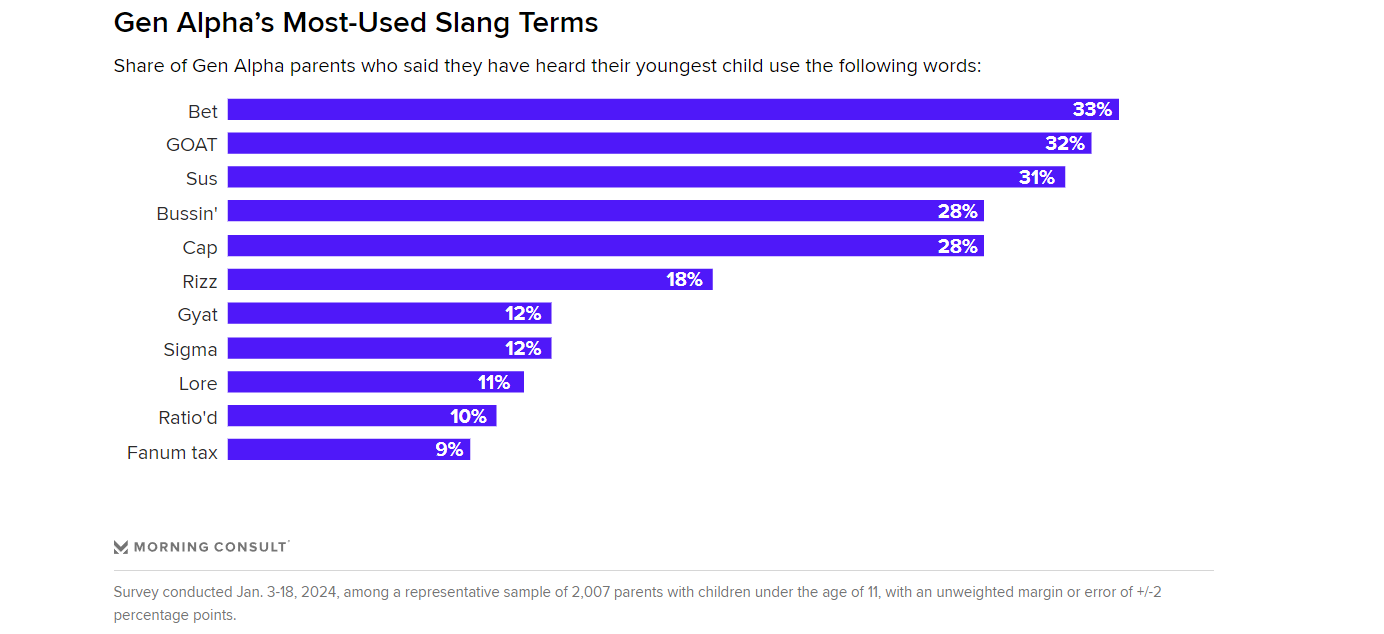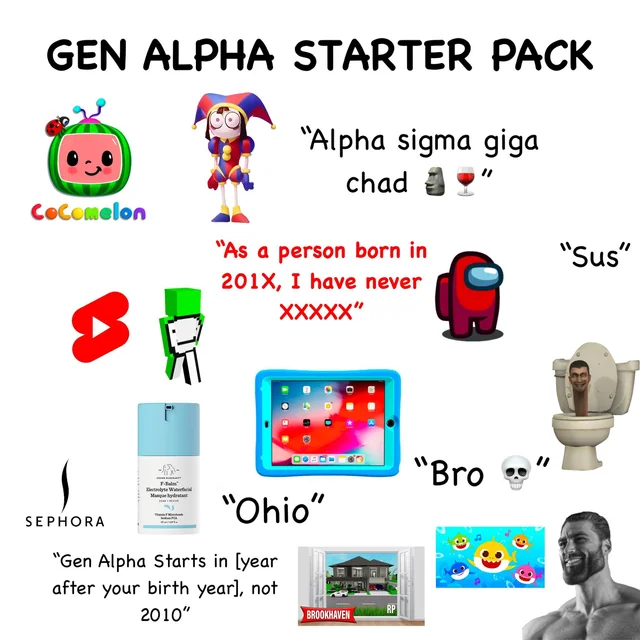Understanding Gen Alpha Slang Words: A Comprehensive Guide
Gen Alpha slang words have become increasingly popular in today's digital world. Born between 2010 and 2025, Gen Alpha is the first generation to grow up entirely in the age of smartphones, social media, and advanced technology. Their unique way of communication reflects their exposure to digital culture and global trends.
As the newest generation to enter the spotlight, Gen Alpha's slang words are not just random phrases but a reflection of their identity and values. This generation uses slang as a tool to express themselves, connect with peers, and navigate the complexities of modern life. By understanding their language, we can gain deeper insights into their worldview and cultural influences.
This article will explore the fascinating world of Gen Alpha slang words. From their origins and meanings to their impact on communication, we will provide a comprehensive overview that will help you stay up-to-date with the latest trends in youth culture. Whether you're a parent, educator, or simply curious about Gen Alpha, this guide will offer valuable insights into their linguistic habits.
Read also:Why The Rate My Avatar Deleted Phenomenon Has Captured Online Attention
Table of Contents
- Introduction
- Who is Gen Alpha?
- Origins of Gen Alpha Slang Words
- Popular Gen Alpha Slang Words
- Slang Trends in Gen Alpha
- Impact on Language and Communication
- Digital Influence on Slang
- Cultural Impact of Slang
- Parental Perspective on Slang
- Educational Impact of Slang
- Conclusion
Who is Gen Alpha?
Gen Alpha refers to individuals born between 2010 and 2025. This generation is unique because they are the first to grow up entirely in the digital age. Their exposure to technology from an early age has shaped their communication style, including their use of slang words. According to a study by McCrindle Research, Gen Alpha is expected to be the most educated and technologically advanced generation in history.
Gen Alpha's slang words often reflect their digital lifestyle. For example, terms like "LOL" (laugh out loud) and "OMG" (oh my gosh) have evolved into more nuanced expressions such as "LMAO" (laughing my ass off) and "SMH" (shaking my head). These phrases are not only used in text messages but also in everyday conversations, showcasing the seamless integration of digital and verbal communication.
Origins of Gen Alpha Slang Words
The origins of Gen Alpha slang words can be traced back to various sources, including social media platforms, online communities, and popular culture. Platforms like TikTok, Instagram, and YouTube play a significant role in shaping their language. For instance, TikTok challenges often introduce new slang terms that quickly gain traction among young users.
Subheading: Social Media's Role in Slang Evolution
Social media acts as a catalyst for the rapid spread of slang words. Memes, viral videos, and trending topics contribute to the creation and popularization of new phrases. A study by Pew Research Center found that 84% of Gen Alpha uses social media daily, making it a powerful tool for linguistic innovation.
Popular Gen Alpha Slang Words
Here is a list of some popular Gen Alpha slang words and their meanings:
- Yeet: A term used to express excitement or agreement.
- Clout: Refers to social status or influence, often used sarcastically.
- GOAT: Acronym for "Greatest Of All Time," used to describe someone or something exceptional.
- Tea: Slang for gossip or the latest news.
- Vibes: Describes the overall atmosphere or feeling of a situation.
Slang Trends in Gen Alpha
Slang trends among Gen Alpha are constantly evolving. One notable trend is the use of abbreviations and acronyms to convey complex ideas in a concise manner. For example, "TBH" (to be honest) and "IDC" (I don't care) are commonly used in conversations. Another trend is the incorporation of emoji-like expressions into verbal communication, such as saying "smh" instead of physically shaking one's head.
Read also:Jennifer Lopez And P Diddy A Tale Of Fame Love And Music
Subheading: Regional Slang Variations
Regional differences also play a role in the development of slang. While some terms are universally understood, others may vary depending on location. For instance, "bruv" is a popular slang term in the UK, while "fam" is more commonly used in the US. Understanding these variations can provide insights into cultural diversity within Gen Alpha.
Impact on Language and Communication
Gen Alpha slang words have a significant impact on language and communication. They introduce new vocabulary and grammatical structures that challenge traditional linguistic norms. This evolution reflects the dynamic nature of language and its ability to adapt to changing social contexts.
Subheading: Digital Influence on Slang
The digital age has accelerated the pace of linguistic change. With instant access to information and global connectivity, Gen Alpha can adopt and adapt slang words at an unprecedented rate. This digital influence has led to the creation of a shared global language, where slang terms can transcend geographical boundaries.
Cultural Impact of Slang
Slang words play a crucial role in shaping cultural identity. For Gen Alpha, using specific slang terms can signal membership in a particular group or subculture. This sense of belonging is reinforced through shared language and communication styles. Additionally, slang can serve as a form of resistance against mainstream norms, allowing young people to express their individuality and challenge authority.
Subheading: Parental Perspective on Slang
Parents often struggle to keep up with the latest Gen Alpha slang words. While some view slang as a natural part of youth culture, others may worry about its impact on formal communication skills. However, research suggests that exposure to diverse linguistic styles can enhance cognitive flexibility and creativity, benefiting children in the long run.
Educational Impact of Slang
In educational settings, Gen Alpha slang words can pose both challenges and opportunities. Teachers may find it difficult to maintain a formal tone in classrooms where students frequently use slang. However, incorporating slang into lessons can make learning more engaging and relatable for students. By acknowledging and addressing slang in education, educators can foster a more inclusive and dynamic learning environment.
Subheading: Balancing Formal and Informal Language
Striking a balance between formal and informal language is essential in today's world. Gen Alpha's proficiency in both styles equips them with valuable communication skills that can serve them well in various contexts. Encouraging the appropriate use of language in different settings can help bridge the gap between casual conversations and professional communication.
Conclusion
Gen Alpha slang words represent a vibrant and ever-evolving aspect of modern communication. By understanding their origins, meanings, and cultural significance, we can gain a deeper appreciation for this generation's unique linguistic style. Whether you're a parent, educator, or simply interested in youth culture, staying informed about Gen Alpha slang words is essential for staying connected in today's digital world.
We encourage you to share your thoughts and experiences with Gen Alpha slang in the comments below. Have you noticed any interesting trends or phrases? Let us know! Additionally, feel free to explore other articles on our site for more insights into contemporary language and culture.
Data and statistics referenced in this article are sourced from reputable organizations such as McCrindle Research, Pew Research Center, and linguistic studies published in academic journals. These sources provide a solid foundation for understanding the complexities of Gen Alpha slang words and their broader implications.


